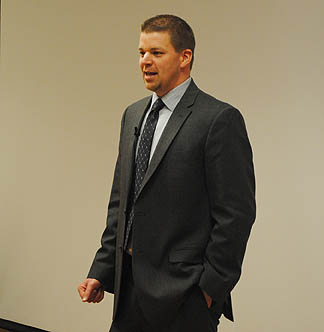
Dr. Travis Williams wrapped up the 2014 Theologian-in-Residence lecture series with a discussion about the use of “good works” in the New Testament epistle of I Peter.
A central theme of the book of I Peter, doing good and performing good works, was the focus of discussion for the last session of the Theologian-in-Residence lecture series at Tusculum College.
“Doing good” had a distinct meaning to those in the ancient Roman world and the author of I Peter redefines the term to help build the early Christians’ identity in their faith, said Dr. Travis Williams, assistant professor of religion at Tusculum, who led the annual series.
Dr. Williams is a leading expert on the often-neglected book, having written two books about the epistle as well as numerous essays and articles. The Theologian-in-Residence is an annual lecture series, now in its 24th year and sponsored by the college with partial funding from Ron Smith.
The use of the terms such as “good works” and “doing good” are used much more in the book of I Peter than in the remainder of the New Testament, Williams noted. A consensus of Biblical interpreters agree that the author of the epistle is encouraging his readers to act in a way consistent with popular standards of conduct recognized by Greco-Roman society to help lessen the amount of hostility towards them.
This position, however, shows a misunderstanding and misinterpreting of good works by these Biblical scholars, Dr. Williams said. An error in this view is its focus on the optimism that doing good will help end the tensions between the Christians and their neighbors and create more positive interaction with outsiders.
But, that optimism is not there nor is doing good works presented as a solution to the persecution issue. Noting I Peter 3: 16-17 he said, the author tells the early Christians to keep their consciences clear so when they are maligned for their good conduct in Christ, they will put their accusers to shame.
Biblical scholars have also interpreted the good works motif as referring to a shared value system including what is seen as good by God and by the Greco-Roman society, Dr. Williams said. However, he said, there was not that much common ground between the two value systems.
The key to interpreting “good works” is to understand how the early Christian reader of the letter would have comprehended the term, he said.
Asia Minor, the area where the Christians lived to whom the epistle was written, was a Hellenistic region, whose culture had been influenced by the Greeks for centuries since its conquest by Alexander the Great.
An important facet of Greek culture was gift giving and the idea of civic benefaction, he explained. Wealthy, elite citizens were recognized as “noble and good” for their contributions to their community. Inscriptions on buildings and statutes that honor these civic benefactors often refer to these individuals as “good and noble” or some variation of the wording.
“It is almost used as a technical term,” Dr. Williams said. These civic benefactors were wealthy citizens, leaders in the community who donate money to the city. These donations were often made toward building construction, supplying grain during times of scarcity, paying for games/spectacles or traveling as an ambassador to Rome for the city.
Some argue that the author of I Peter is encouraging Christians to become civic benefactors and donate money to the city. However, Dr. Williams said, there are three problems with this view. First, most Christians were not wealthy and could not become benefactors. Secondly, there was not a real need for the donations the benefactors were making because cities collected taxes for these projects, which leads to the third problem. Since the donations were not needed, these donations were part in a socio-political struggle between wealthy citizens for a limited amount of honor, and it is unlikely that these citizens would allow Christians as part of a disliked group to compete for prestige.
Instead, the author of I Peter draws on this “good works” language, using it in a subversive way to give it another meaning. The author uses the language as part of his encouragement to the readers to cautiously resist the societal norms of the Greco-Roman world by taking a known term but presenting it in an alternative way than what is expected, Dr. Williams continued.
“Doing good” is given a theological value in passages such as I Peter 3:16, he said. “Good conduct is to not be determined by society but by following Christ,” he continued. The epistle defines good works as how Jesus defined them, he said, and the author mentions prayer, hospitality, loving others as oneself and using spiritual gifts as good works in the epistle.
Redefining the term “good works” has an internal function as well, Dr. Williams said. The book of I Peter is addressing a beleaguered group and encouraging them to continue in their faith, he continued.
The author is providing a way for the early Christians to cope with their disadvantages. “He is not encouraging them to change the situation but to change how they view themselves,” Dr. Williams said.
By redefining such terms as good works and doing good, the author is relocating a source of self esteem, changing “good and noble” from how it is defined by their society to a definition centered in following Jesus that his readers can achieve.


